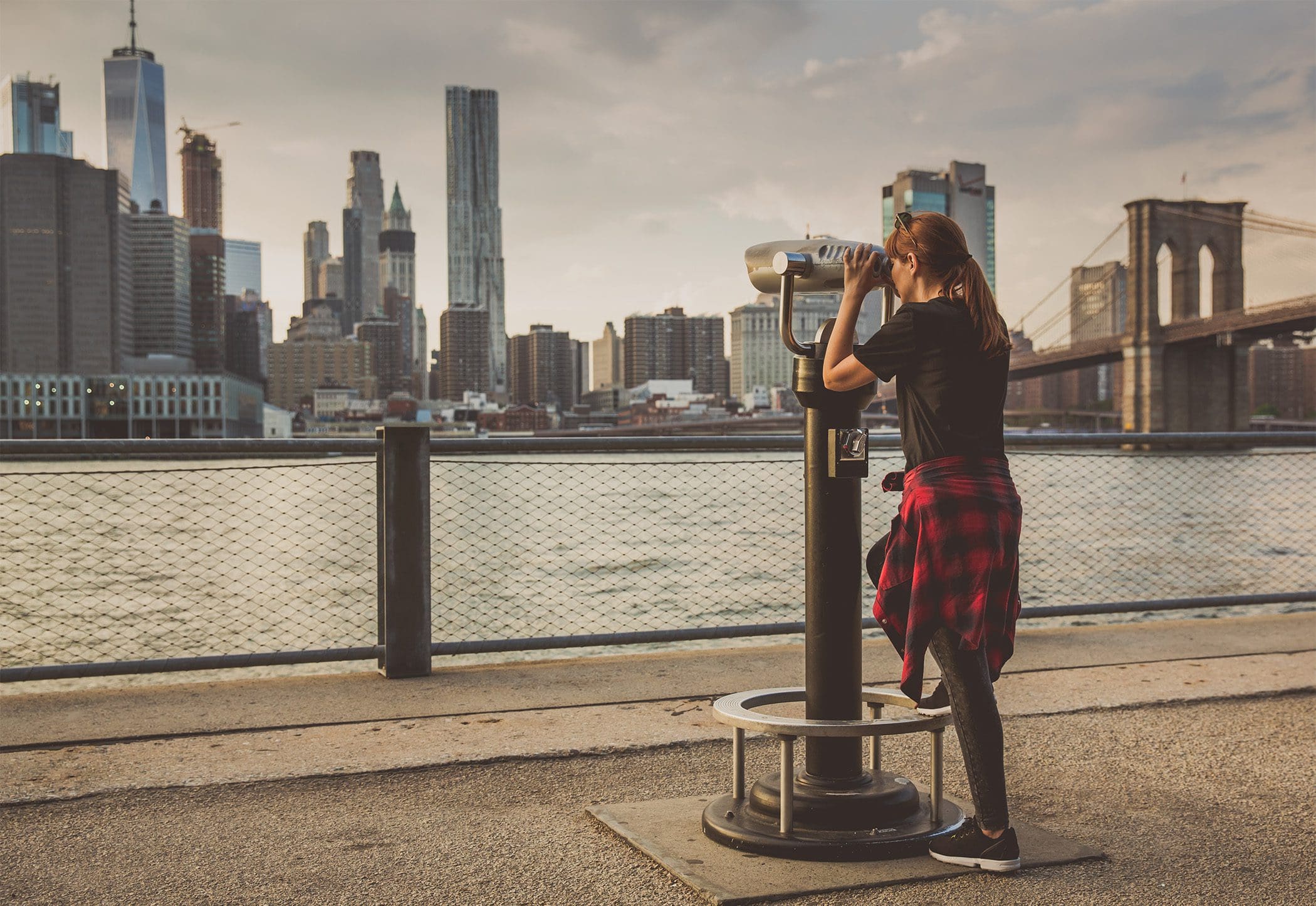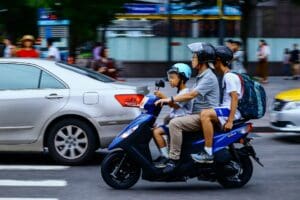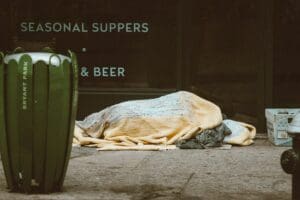By: Chau Lam
As New York City slowly emerges from the havoc wreaked by the COVID-19 pandemic that brought to light vast inequities in the five boroughs, former City Hall officials, heads of nonprofit organizations, and business and labor leaders are pitching their ideas on policy changes they say will build a more equitable city.
In a report released Wednesday by the Center for an Urban Future that was exclusively shared with Gothamist, the public policy think tank asked 150 industry leaders “to contribute a single policy idea that would expand economic opportunity for all, strengthen social infrastructure in communities across the five boroughs, and build a more equitable city.”
The ideas range from big tasks that would involve funding from the city to smaller, artistic endeavors. Among the ideas are proposals to expand health care services — from increasing accessibility through mobile health units and access to birthing resources— to measures that would bolster the city’s safety net systems for some of the most disadvantaged.
“The report provides a roadmap for how the city can close the troubling inequalities that still exist across New York, and also help far more New Yorkers get on the path to a better, more prosperous life,” said Jonathan Bowles, the think tank’s executive director.
Bowles added that the report would be the focal point of a symposium the think tank is hosting on Monday, Oct. 3, where City Council Speaker Adrienne Adams, Deputy Mayor of Strategic Initiatives Sheena Wright, and Manhattan Borough President Mark Levine are slated to speak.
While there aren’t estimates for how much each proposal could cost to implement, the Center for an Urban Future plans to narrow down the focus of its report and identify the price tag of certain ideas and how to practically implement them, Bowles said.
A spokesperson for Mayor Eric Adams did not immediately respond to a request for comment.
Here are four takeaways from the 89-page report:
Expand mobile health units
A former top health official under Mayor Bill de Blasio argues that the Adams administration should expand a pandemic-spurred program that dispatched mobile health teams into areas where vulnerable New Yorkers, like people who are homeless, gather.
Melanie Hartzog, the former deputy mayor for health and human services who’s now president of the New York Foundling — one of the city’s largest child welfare organizations — said the initiative from the previous mayor resulted in 5,000 vaccinations administered, 9,000 medical consultations and the distribution of 1,000 Narcan kits that help reverse the effects of an opioid overdose in 2021.
Most vulnerable New Yorkers – such as homeless individuals living in public places – do not have access to preventative health care, a problem that Hartzog said has led to alarming rates of chronic disease, lower life expectancy, and disproportionate impacts from COVID-19.
“The initiative hit on a successful way to reach the hardest-to-serve New Yorkers, but so far it has only been rolled out to a small handful of neighborhoods. It’s time to expand the program and bring preventative care to far more New Yorkers,” Hartzog said in the report.
“It was successful because we were able to meet immediate needs right then and there,” Hartzog said in an interview. “We wanted to stack as much intervention services that we could right then and there in the moment to support that individual. And particularly with the street homeless, if you can’t really provide the then and there, it’s very hard to engage.”
Expand doula support
Black women are eight times more likely than white women to die from pregnancy-related causes, according to a 2019 city report.
The answer to this problem is more doulas — essentially birthing coaches who guide mothers through labor and afterward — said Toya Williford, a trained doula and a former executive director of the Mayor’s Fund to Advance New York City.
According to the city report, the care provided by doulas was linked to lower rates of cesarean birth, preterm birth, low birth weight, and postpartum depression.
“Evidence has shown that having labor support can help reduce unnecessary medical interventions,” said Williford.
“Evidence has also shown that having labor support allows women to not only have the birth that is best for them, but again decreases the unnecessary medical intervention that can lead to adverse birth outcomes.”
Earlier this month, Adams signed a City Council-led proposal into law that codifies a health department program to train doulas and provide their services to residents in marginalized communities across the city in an effort to lower maternal mortality rates among Black women.
Maternal mortality among Black women has been a topic close to the mayor, who campaigned on a plan to offer doulas to all first-time mothers in New York City following the deaths of Amber Rose Isaac and Sha-asia Washington, two 26-year-old Black women who died during delivery in 2020. Their deaths ignited calls for scrutiny on how the health care system treats Black women.
Although the Adams administration is taking steps to broaden access to doulas by turning the health department initiative into law, Willford said the city should expand the program to all women giving birth in the city’s public hospitals.
To ensure newborns get a good start in life, Williford also recommends the city create a CUNY certificate program to increase the number of doulas and make sure every public hospital has well-paid doulas on call.
The city’s health department did not immediately respond to requests for comment.
Open Summer Youth Program to Undocumented Youth
The mayor has repeatedly touted the city’s summer youth program, which provides jobs to people ages 14 through 24, as a deterrent from getting into trouble.
The goal of the program, the mayor said in July, was not to wait until “young people fall in the river of despair” and for the city to spend “countless” dollars and resources after the fact “ but to go upstream and provide them the services that they deserve.”
A record 100,000 young people participated in the program this past summer, Adams said in July as he was announcing additional funding for the program.
Brian Cohen, executive director of Beam Center, an educational nonprofit based in Brooklyn, argues that the program should be opened to undocumented young people, who are otherwise shut out of typical employment because they lack social security numbers or work authorization.
“Many young people in the city, whether they’re undocumented or not, are contributing to their families’ economic stability,” said Cohen. “And therefore, having them paid for certain learning experiences is a way of keeping them on track in their education.”
There are an estimated 835,000 undocumented people in New York state and 14% are between the ages of 16 to 24, according to the Migration Policy Institute.
To make paid summer internships more accessible to undocumented teens, Cohen said the city should establish a system using tax IDs, which are issued regardless of immigration status. He said such a system would allow undocumented individuals to take part in internships while also being paid for their labor.
Universal basic income
The idea is straightforward: provide cash to people in need.
Andrew Yang made universal basic income a tenet of his presidential campaign in 2020, and carried it over into his 2021 bid for New York City mayor, where he proposed giving New Yorkers living in “extreme poverty” an average of $2,000 a year.
While dozens of pilot programs have sprung up in recent years, including in Los Angeles, Saroya Friedman-Gonzalez, the executive director of New Yorkers for Children, which works with youths who age out of the foster care system, says New York City should launch a universal basic income program for young people aging out of foster care.
“They’re hitting a cliff. If we could provide cash support, this could really stabilize their lives and allow young people to step out of poverty,” Friedman-Gonzalez said.
Only half of the youths in foster care find work by the time they reach 24 and 20% experience homelessness as soon as they age out of foster care, Friedman-Gonzalez said in the report.
Her organization, along with a few other nonprofits, tested out the idea during the pandemic’s early stages. Her organization gave $800,000 cash payments to young adults and families in 2020, money that went to food, rent, and childcare.





















